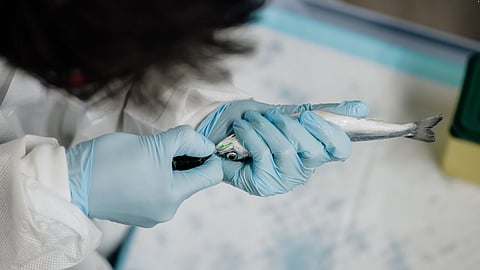

Onda is tackling Tenacibaculum, a threat to farmed salmon, cod and sea bass, with new disease models.
Photo: Onda
Onda, a Canadian contract research organization focused on aquaculture health and innovation, based in Prince Edward Island, Canada, has announced it is expanding its work on Tenacibaculum, a bacterial fish disease considered to be one of the most difficult aquaculture pathogens to manage worldwide.
The company, which claims to operate the largest aquatic containment facility in aquaculture research, says it has expanded its Tenacibaculum expertise with new disease challenge models for T. dicentrarchi and T. finnmarkense, complementing its existing T. maritimum platform, launched in March 2024 as the first of its kind.
Tenacibaculum is a genus of marine bacteria that causes tenacibaculosis, a major disease in aquaculture characterised by skin ulcers, fin and mouth lesions, and increased mortality - and which is responsible for outbreaks as far afield as Norway, Chile and Canada. The disease can severely affect farmed species like salmon, cod and sea bass, leading to significant economic losses through reduced growth and stock mortality. An added challenge in managing the disease threat is that the bacteria affect different host species and regions in distinct ways.
In a press release announcing the expansion to its research on the bacteria, Onda noted that diseases caused by Tenacibaculum are among the costliest in aquaculture, with infections in salmon alone estimated to cost producers tens of millions of dollars each year.
Onda said its expanded range of models will help aquaculture producers, vaccine developers and feed manufacturers test products under conditions that closely replicate real-world disease challenges.
“With the expansion to include T. dicentrarchi and T. finnmarkense, Onda can now support producers and innovators in geographies where these strains pose major threats, including salmon farming regions across Chile, Norway, Canada and Northern Europe,” the company stated.
“These new models light the path forward, turning complexity into clarity in the fight against tenacibaculosis, and mapping the battlefield so our clients can get ahead,” said Dr Fabio Zanuzzo, Director of Aquatic Animal Health at Onda.
“These new models underscore Onda’s commitment to addressing the aquaculture industry’s most urgent health challenges,” said Onda CEO Myrna Gillis. “By equipping our clients with robust research platforms, we help them bring effective solutions to market faster, supporting healthier fish, stronger businesses, and a more sustainable food supply.”
